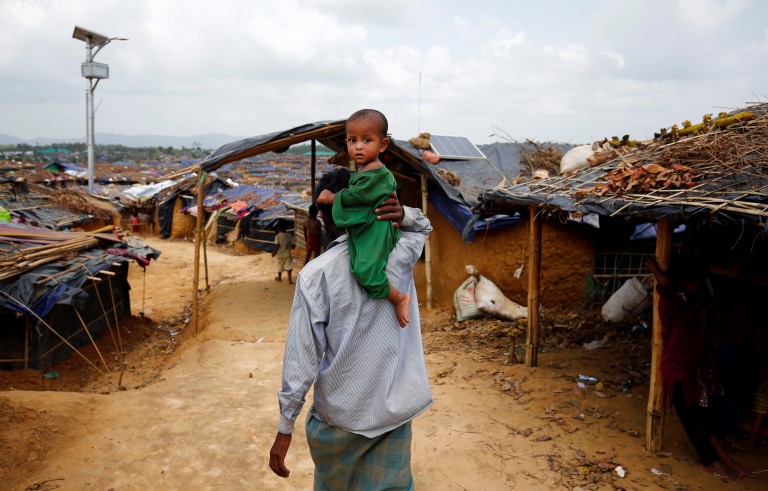JUDY WOODRUFF: Brutal wars in the Middle East, Africa and Asia have forced the world's populations of refugees and displaced persons to near record highs.
Meanwhile, the Trump administration has signaled its intention to substantially change U.S. refugee policy.
Filippo Grandi, who is the United Nations' top official leading the response to the refugee crisis, is in Washington this week for meetings at the White House and Pentagon.
Our William Brangham sat down with him earlier this evening.
WILLIAM BRANGHAM: Hi, Commissioner Filippo Grandi. Welcome.
FILIPPO GRANDI, United Nations High Commissioner for Refugees: Thank you.
WILLIAM BRANGHAM: You're here in Washington, D.C., obviously this week to meet with some members of the Trump administration.
I'm curious, what message are you here to convey to them?
FILIPPO GRANDI: A message that I have already conveyed in previous visits.
U.S. leadership in humanitarian matters and specifically in matters concerning responses to refugee crisis is very important, continues to be very important. And the response I get is quite good.
WILLIAM BRANGHAM: What is that response? What do you hear back from them?
FILIPPO GRANDI: Well, I think we all watched Ambassador Haley, the U.S. ambassador to United Nations …
WILLIAM BRANGHAM: Nikki Haley, yes.
FILIPPO GRANDI: … visit recently refugee programs in Turkey and in Georgia. We're talking about Syrian refugees, the biggest refugee crisis in the world.
And her message was very clear and very strong. United States' generosity and United States' support for refugees continues to be strong and constant. And I greatly appreciated this message on her part.
WILLIAM BRANGHAM: I know Ambassador Haley has said that on several occasions.
But we have also seen President Trump try to pass through an executive order that, in effect, says, we're not taking any refugees in the U.S. And the president has conflated refugees with the fear of terrorism, saying, we can't know who these people are.
Is this something that you bring up with administration officials? Do you talk with them about those concerns that they have shared?

FILIPPO GRANDI: A great deal.
In fact, I don't think there was ever any statement saying that no more refugees should come to the United States. There were decisions to increase the vetting of those selected to come here and to limit certain nationalities. All this, as you know, is now being discussed in the judicial sphere. So we have to wait for that discussion, which is an American, a U.S. discussion to finish.
Our message is, resettlement programs — this is what we're talking about — are a very important tool to protect the most vulnerable refugees. And vetting is already quite strong for those refugees that enter that program. Of course, this is a sovereign decision of the United States, but I think and I hope that, after all this is done, after conclusions are made, that program will be preserved.
I think it may be reduced to previous higher levels, but I hope that, with the passage of time and once these controls — once the administration confident that the controls are there, will we continue to see robust resettlement to the United States.
WILLIAM BRANGHAM: The reason I ask about this is, this is not just a concern expressed by President Trump, but even Chancellor Angela Merkel in Germany has seen a good deal of resistance to her very open embrace of refugees.
There still is a very strong fear, a conflation of refugees with the fear of terrorism. And I'm just curious what you — what do you say to world leaders when they express this, that we don't have the political appetite to take refugees onto our shores?
FILIPPO GRANDI: The fear of insecurity is a very understandable one, especially in a world in which terrorism has created so much damage and killed so many people.
And we are, of course, with states in saying controls, checks, vetting have to be carried out in the most — in the strongest possible way. This is absolutely true.
But I also pass another message. In fact, it's very rare, if ever, that refuges coming from situations of war, of violence, of violations of human rights perpetrate crimes of terrorism. It is not they who do that. It is other people. In fact, those people do not bring terror. Refugees flee from terror.
I think it's very important not to conflate refugees and terrorists in this sense. It's very important to control, it's very important to check, but it's also very important to make that distinction, and never forget where these people come from.
WILLIAM BRANGHAM: Lastly, a quick question on funding.
I know this is obviously an enormous challenge for the U.N. Do you have enough money to do the work you need to do?
FILIPPO GRANDI: Certainly not.
Our budget last year was calculated at 7 billion U.S. dollars, 2016. We got billion U.S. dollars. So about 55 percent of our needs the covered. This means that we do a lot of prioritization. And we prioritize, evidently. With so many refugee crises, with 65 million refugees and displaced people around the world, we have to prioritize lifesaving activities.
What suffers? What suffers what is not immediately vital and necessary, but which is equally important, like education, livelihoods. That's why we're looking at other ways to meet those needs with other sources of funding, because they're equally important in the long run to sustain assistance to millions of refugees.
WILLIAM BRANGHAM: Filippo Grandi, thank you very much for being here.
FILIPPO GRANDI: Thank you.












